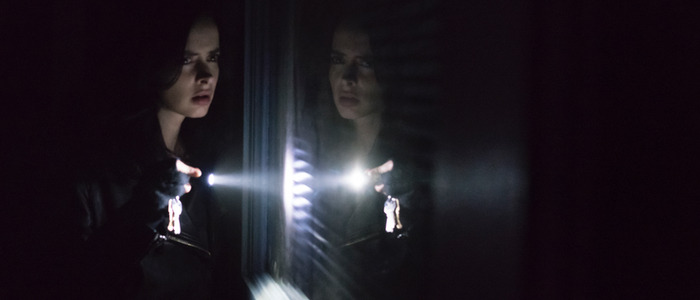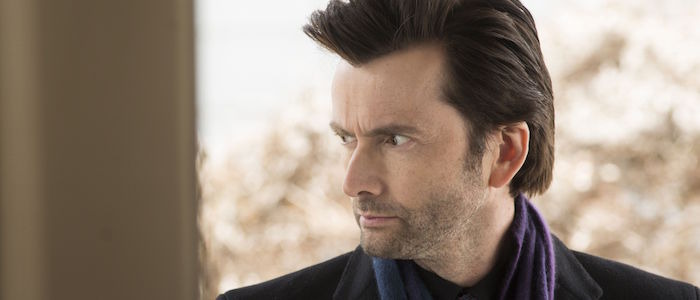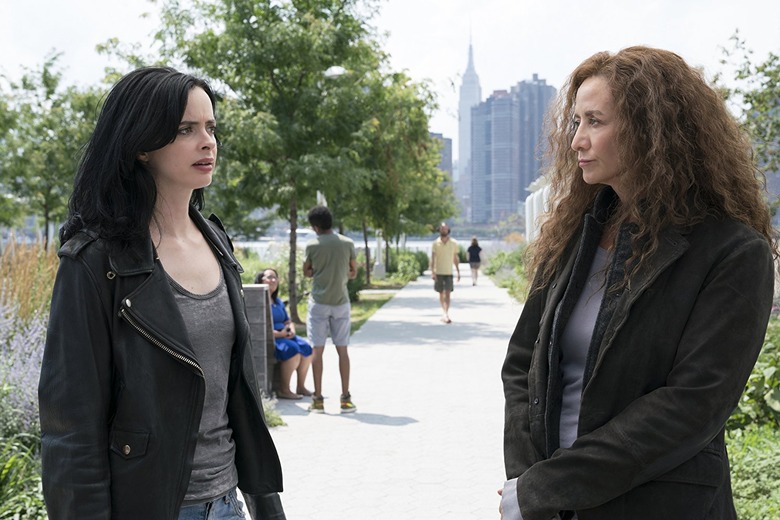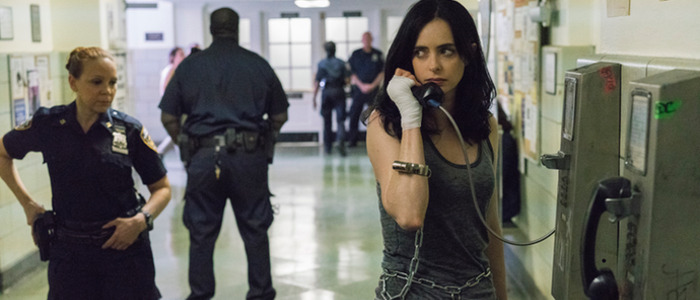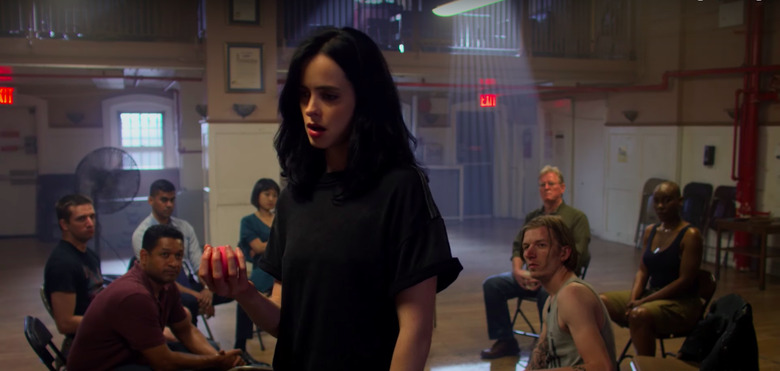How 'Jessica Jones' Uses Words As Weapons
In its second season, Jessica Jones has gotten angrier and messier. Through its exploration of Jessica's tragic past, the show has remained an unflinching look at trauma and healing — how one gifted woman processes years of abuse, abandon, and plain old misogyny.Jessica uses multiple coping mechanisms to deal with this trauma, among them binge drinking and physical violence. But she also shields herself with words, often vulgar, cutting words. It's tempting to read these caustic insults as a reflex, a defense Jessica has forgotten she even puts up to keep people from getting too close. Yet her use of and reaction to language is quite intentional, and it's part of what makes Jessica Jones such an interesting superhero.
Sharp Sentences
"People do bad s***," Jessica says in the pilot episode. "I just avoid getting involved with them in the first place." This colorful quote serves as a sort of mission statement for the character. She's not interested in vulnerability or real relationships, and she'll be rude about it if she has to be. Jessica's blunt, biting choice of words was written into her story from the beginning. The first issue of Alias, the comic book series which introduced her, has "fuck" printed three times on the opening page.
This character quirk serves a couple purposes. On the most basic level, it communicates that Jessica is one tough broad — the swearing is there to match all the drinking and brawling. On another, it speaks to Jessica's deeply ingrained intimacy issues, which have only hardened as she lost her family and control of her body many times over. But Jessica isn't just lashing out in grief; she's aiming to bruise. Language is one of her many weapons, and it's one she picked up from her greatest abusers.
Mommie Dearest
Jessica's first abusers, her doctors, hurt her with actions, not words. But her adoptive mother Dorothy Walker has quite a way with them. Dorothy seems like a sunny, sweet woman at first glance. She smiles broadly when her adoptive daughter "Jessie" shows up unannounced at her casting agency in the seventh episode of the first season. Even as Jessica lays into her, demanding she stay away from her famous biological daughter Trish, Dorothy remains strangely perky. But she knows when to drop the facade and strike. "Need a better tagline," she quips while Jessica threatens her. Then she casually drops the real gut punch: "Taking you in was the worst decision of my life."That's just a glimpse into what Jessica's adolescence looked like. We later learn from flashbacks that Dorothy only took Jessica in to make herself look charitable and cover up a tabloid story about Trish. She never treated Jessica like her own child, just a piece of her publicity machine. She abused even the daughter she proudly claimed, though we don't really see the physical abuse Trish endured onscreen. We mainly hear the screamed insults.
Kilgrave’s Smile
Jessica's most sadistic abuser, the one who looms over the entire series, uses his words in a more frightening, devastating way. Kilgrave, a British man with sinister charm and a penchant for purple suits, has little use for Jessica's f-bombs or Dorothy's passive aggression. He can end lives with a simple sentence.The words that Kilgrave says are clear and direct. He only occasionally growls or shouts them, preferring to intone them in a calm, steady voice. But they knock the breath out of your body. "You'd like to invite me in." "Go to the blender, lower your right hand in there." "If I'm not back within two hours, please remove the skin from each other's faces." Anyone who hears these words knows their power, for Kilgrave's commands are impossible to refuse. And he is always commanding, never asking.One of Kilgrave's most innocuous yet insidious orders is "smile." It's repeated throughout the first season, and the name of the finale. Any woman knows the loaded meaning of "smile." It's a seemingly simple, even friendly request uttered by so many men in public spaces. It has many variations, like "Smile, gorgeous" or "You're so pretty, why don't you smile?" But it's not really a request — it's meant the way Kilgrave means it, as a command.As Libby Hill wrote in The Los Angeles Times, "Telling a woman, particularly a stranger, to smile presumes unearned familiarity. Worse, it implies a right to dictate behavior." Hill and many others praised the show for using this single word as a commentary on street harassment and real-life sexism, and this commentary builds to a cathartic climax where Jessica, at Kilgrave's request, smiles and then promptly snaps his neck. Jessica took a word that had been dogging her for 13 episodes, that has been dogging women for ages, and literally drained it of its power.While Kilgrave is obviously more monstrous, he and Jessica both use language in harmful ways. Their delivery is completely different, but they both understand the weight of words. The difference lies in who they're trying to harm. Kilgrave is pure evil, so his victims are not limited in scope. He'll torture anyone who gets in his way, anyone who gets in between him and Jessica, or anyone who bores him. Jessica is a little more focused. Although she'll casually burn a stranger on the street or one of her few friends, she saves her most pointed insults for those threatening or abusing her — and where words fail, her fist does not.
Bitches and Dickheads
Season two doesn't have an exact "smile" equivalent, but Jessica does continue stripping words of their sexist power. Spoilers for the new season lie ahead.The flashback episode, "AKA I Want Your Cray Cray," showcases this skill repeatedly. It all starts when a thug named Wyatt busts into the apartment Jessica shares with her boyfriend Stirling. Wyatt and Jessica immediately get off on the wrong foot, as he congratulates Stirling for "finally getting that nice trim." (For, sigh, reference.) "Not trim, and definitely not nice," Jessica shoots back. She stays pretty calm, even as Wyatt threatens Stirling and punches him in the gut. But then Wyatt calls her a bitch. She picks up the Chinese takeout on her counter and shoves it so hard into Wyatt's face, he nearly chokes to death. When she releases him, he sputters, "Oh s***. She's...." "A bitch," Jessica finishes. The word is hers now, and it's not the only time she physically wrests it from a s***ty dude.The second time happens at a nightclub, where Jessica goes to find Trish. Her sister is hopped up on drugs, about to perform oral sex on the club owner, Gus, in the bathroom. Jessica breaks it up and even though she's fuming mad at Gus, she doesn't move a muscle. Until he mutters, "Bitch." Jessica slams his face into the mirror. "Call me a bitch again," she says, as he squirms, "Compare me to a dog. An animal that you can kick and collar. Say it." He timidly repeats the word, and she pushes him onto the ground. "Redefine the word, dickhead."Dickhead is a funny insult, but it has none of the weighty and uniquely gendered implications of a word like "bitch," and Jessica knows it. When she has no equivalent comeback in the dictionary, she recognizes that the only hand she can play is her supernatural strength. It may be an unfair advantage, but Gus has one, too: centuries of culturally ingrained sexism. And he already used his.
Supporting Subplots
Jessica isn't the only one with a drive to reclaim or warp words designed to put specific people down. In fact, her reaction to gendered insults runs in the family. Her long-lost mother Alisa has a fiery rant of her own with a cabbie who won't stop texting while driving. Alisa knows she is in the right, but when she asks the driver to stop, he dismisses her complaints outright, telling her to "calm down, lady." Alisa, whose rage is even more dangerous than Jessica's, arches her eyebrows and replies, "Excuse me?" There's enough venom in her voice to make her daughter nervous, but this cabbie isn't scared. Female rage is easily dismissed as hysteria, which is why he makes the grave mistake of telling her not to get her "panties in a bunch." Cue Alisa: "Our panties? Grown goddamn women don't wear panties. We wear underwear!"Jessica pushes Alisa out of the cab, cutting the conflict short. But based on Alisa's anger management issues, that driver was in for a hefty hospital bill.Jesscia's associate investigator Malcolm also grapples with an awful word, a slur that targets queer people. It's yelled at him while he's negotiating with a closeted lawyer outside a gay bar. Malcolm shouts back, "Assholes!" But just as "dickhead" is weightless compared to "bitch," "asshole" does not carry the same pain as "f*****," a word seeped in violent homophobia. That doesn't matter to the three men who shouted the slur. Angry that their insult didn't silence Malcolm or make him shrink into the wall, they confront him. They call him a "homo thug," a "pussy," and push him repeatedly, until Malcolm takes a swing. He's outmatched, but Trish runs to the rescue, sending the three bullies running scared. The personal stakes in this fight aren't the same as the others, since neither Malcolm nor Trish are, as far as we know, queer. The slur didn't hurt Malcolm the way those men intended, but it wasn't victimless — Steve Benowitz, the closeted lawyer, heard it loud and clear.
Verbal Violence
Jessica Jones is a bloody, bruising show with its share of grotesque tableaus. (See: Alisa's hospital breakout, all of Kilgrave's torture scenes.) But some of the most damaging violence is verbal, not physical. Jessica understands what words can do. She spent her teenage years on the receiving end of some brutal ones, then fell under the spell of a man who manipulated them to make her a murderer. She senses the unique hatred in particular words, words designed to belittle and shame people who don't have her powers, and twists them around to attack bigots. It's one of her many gifts, and it's why she's so damn good at her job.

